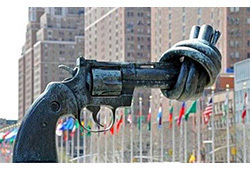
Twenty-one countries around the world — one-ninth of the United Nations’ roster — do not maintain standing armies. Demilitarized states share some commonalities: (1) the decision to demilitarize, or not to have an army, always follows a pivotal moment in history (e.g. military coup, foreign invasion, reaching independence); (2) they have security arrangements with a regional hegemon and/or alliance; (3) they have not been attacked or invaded; (4) they maintain public safety and border security organizations; (5) they are consolidated democracies; and (6) they are more prosperous and spend more on healthcare, education, and socioeconomic development than their neighbors with armed forces.
While “States without Armies” addresses all 21 army-less states, this conversation featuring Zoltan Barany, the Frank C. Erin, Jr., Centennial Professor at the University of Texas at Austin, and Laurie Nathan, professor of the practice of mediation and Mediation Program director at the Kroc Institute for International Peace Studies, focuses on the experiences of Costa Rica, Iceland, Mauritius, Panama, and the Solomon Islands.
This event will be recorded and uploaded to the Kroc Institute's YouTube channel.
Originally published at kroc.nd.edu.